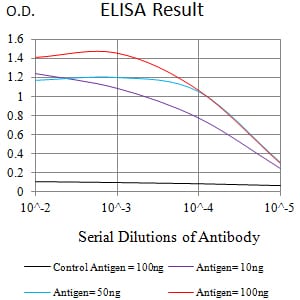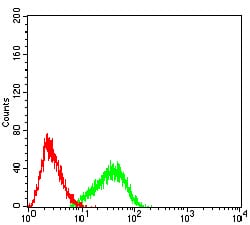

| WB | 咨询技术 | Human,Mouse,Rat |
| IF | 咨询技术 | Human,Mouse,Rat |
| IHC | 咨询技术 | Human,Mouse,Rat |
| ICC | 技术咨询 | Human,Mouse,Rat |
| FCM | 1/200 - 1/400 | Human,Mouse,Rat |
| Elisa | 1/10000 | Human,Mouse,Rat |
| Aliases | TNFRSF18; AITR; CD357; GITR-D |
| Entrez GeneID | 8784 |
| clone | 6H8B9 |
| WB Predicted band size | 26kDa |
| Host/Isotype | Mouse IgG1 |
| Antibody Type | Primary antibody |
| Storage | Store at 4°C short term. Aliquot and store at -20°C long term. Avoid freeze/thaw cycles. |
| Species Reactivity | Human |
| Immunogen | Purified recombinant fragment of human GITR (AA: 184-241) expressed in E. Coli. |
| Formulation | Purified antibody in PBS with 0.05% sodium azide |
+ +
以下是3篇关于GITR抗体的参考文献及其摘要概括:
---
1. **文献名称**:*Agonist Anti-GITR Monoclonal Antibody Induces Melanoma Tumor Immunity in Mice by Altering Regulatory T Cell Stability and Intra-tumor Accumulation*
**作者**:Cohen AD, et al.
**摘要**:该研究探讨了激动型GITR抗体(DTA-1)在黑色素瘤小鼠模型中的作用,发现其通过抑制调节性T细胞(Tregs)的稳定性并减少肿瘤内Tregs的积累,从而增强效应T细胞的抗肿瘤活性,为GITR抗体联合免疫治疗提供了机制支持。
---
2. **文献名称**:*GITR Engagement Synergizes with PD-1 Blockade to Increase T Cell Priming and Antitumor Immunity*
**作者**:Lu L, et al.
**摘要**:研究表明,GITR抗体与PD-1抑制剂联用可显著增强T细胞活化和肿瘤特异性免疫应答。通过激活GITR信号通路,逆转T细胞耗竭,并在多种小鼠肿瘤模型中观察到协同抗肿瘤效果。
---
3. **文献名称**:*Glucocorticoid-Induced TNFR-Related Protein (GITR) Ligand as an Agonist of Costimulatory Signaling in CD8+ T Cells*
**作者**:Stephens GL, et al.
**摘要**:该文献揭示了GITR抗体通过结合CD8+ T细胞的GITR受体,直接增强其增殖与细胞因子分泌能力,同时抑制Treg的免疫抑制功能,为开发GITR靶向的癌症免疫疗法提供了理论基础。
---
**备注**:以上文献均发表于免疫学或肿瘤学期刊(如*Journal of Immunology*、*Cancer Research*等),可通过PubMed或Google Scholar搜索标题获取全文。如需更多文献或具体发表年份,可进一步补充检索。
Glucocorticoid-induced tumor necrosis factor receptor-related protein (GITR), also known as TNFRSF18. is a cell surface receptor belonging to the TNF receptor superfamily. Primarily expressed on regulatory T cells (Tregs) and activated effector T cells, GITR plays a dual role in immune regulation. Its interaction with its ligand (GITRL) enhances effector T cell activation, proliferation, and cytokine production, while simultaneously suppressing the immunosuppressive function of Tregs. This unique mechanism positions GITR as a promising therapeutic target for modulating antitumor immunity and autoimmune diseases.
GITR-targeting antibodies, typically designed as agonistic agents, aim to amplify antitumor responses by boosting effector T cell activity and overcoming Treg-mediated immune suppression. Preclinical studies in cancer models demonstrate that GITR agonism promotes tumor regression, often synergizing with checkpoint inhibitors like anti-PD-1/PD-L1 therapies. However, clinical trials have shown mixed results, with efficacy influenced by antibody design, dosing strategies, and patient selection. Some candidates, such as INCAGN01876 and MK-4166. have progressed to phase I/II trials, highlighting both safety profiles and variable tumor response rates. Challenges remain in optimizing target engagement and minimizing systemic immune-related adverse events. Current research focuses on combination therapies, biomarker identification, and engineering bispecific antibodies to enhance tumor-specific targeting.
×